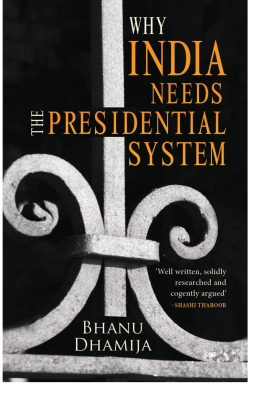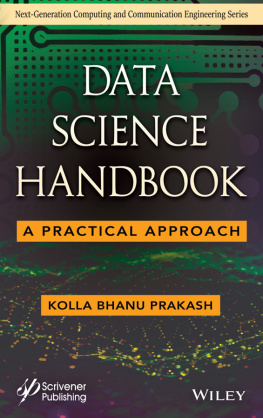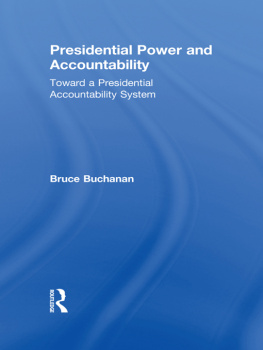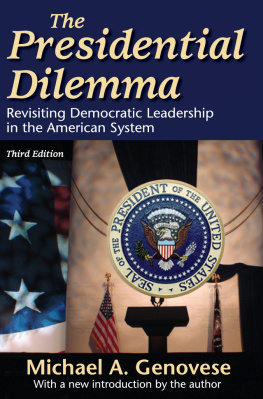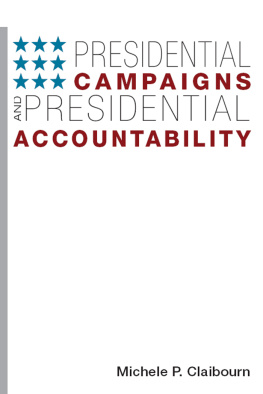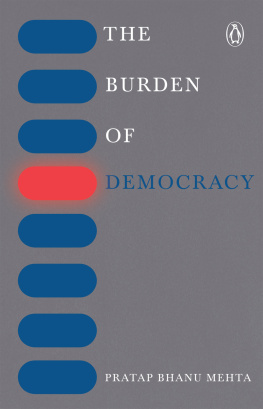Bhanu Dhamija - Why India Needs the Presidential System
Here you can read online Bhanu Dhamija - Why India Needs the Presidential System full text of the book (entire story) in english for free. Download pdf and epub, get meaning, cover and reviews about this ebook. year: 2015, publisher: Harpercollins, genre: Politics. Description of the work, (preface) as well as reviews are available. Best literature library LitArk.com created for fans of good reading and offers a wide selection of genres:
Romance novel
Science fiction
Adventure
Detective
Science
History
Home and family
Prose
Art
Politics
Computer
Non-fiction
Religion
Business
Children
Humor
Choose a favorite category and find really read worthwhile books. Enjoy immersion in the world of imagination, feel the emotions of the characters or learn something new for yourself, make an fascinating discovery.
- Book:Why India Needs the Presidential System
- Author:
- Publisher:Harpercollins
- Genre:
- Year:2015
- Rating:3 / 5
- Favourites:Add to favourites
- Your mark:
- 60
- 1
- 2
- 3
- 4
- 5
Why India Needs the Presidential System: summary, description and annotation
We offer to read an annotation, description, summary or preface (depends on what the author of the book "Why India Needs the Presidential System" wrote himself). If you haven't found the necessary information about the book — write in the comments, we will try to find it.
Why India Needs the Presidential System — read online for free the complete book (whole text) full work
Below is the text of the book, divided by pages. System saving the place of the last page read, allows you to conveniently read the book "Why India Needs the Presidential System" online for free, without having to search again every time where you left off. Put a bookmark, and you can go to the page where you finished reading at any time.
Font size:
Interval:
Bookmark:
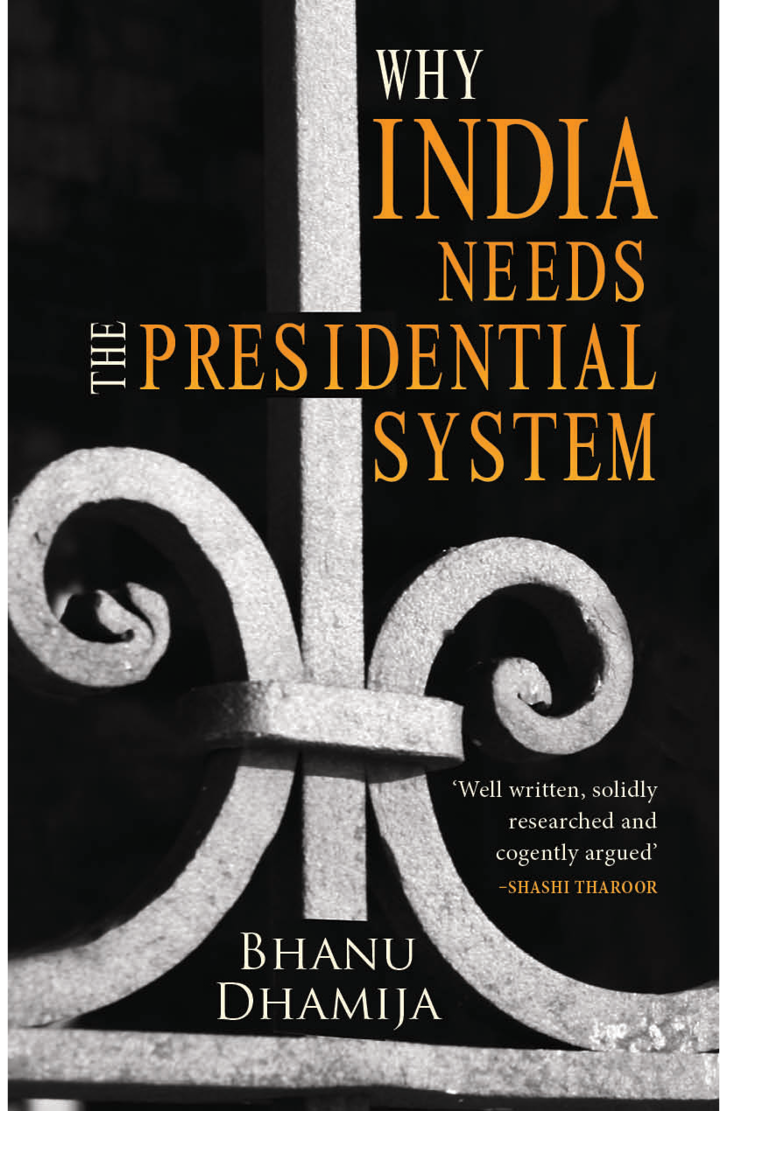
Cover

Title Page
Why India Needs the Presidential System
Bhanu Dhamija

To all those who care for India
A great society is languishing. The citizens of India have access to a pathetic quality of life and discredited institutions. The result is a morally weak populace. Rather than lament or just comment, I decided to do something concrete. I moved back to India after living in the US for nearly two decades and launched a daily newspaper for the community in which I was going to live. The thinking was that the ideas and exposure that my newspaper brought would change public opinion. It probably did. But the rot, I realized, was much deeper than just a lack of awareness. This hardened my resolve and the result of that process of churning is this book. India is my only cause. I have no political, ideological or party affiliations.
This book is an attempt to save India. With each passing day, the current system of government in India is doing irreparable harm by killing peoples initiative and destroying their moral fibre. The book offers a prescription, not just a diagnosis. It is no lecture, but a heartfelt effort to heal India of its ailments. That the treatment is not a new invention is reassuring. I do not ask the reader to follow me, but the much wiser founders of the American system. Whatever else ails that society, my study convinces me of the efficacy of their system of government.
I am thankful to HarperCollins for publishing this controversial book, and to its highly professional yet kind-hearted editors. For bringing me to them, I am forever grateful to Kanishka Gupta, a literary agent with a divine eye. As I was about to lose faith in the face of many rejections, Kanishka was a godsend. The doyen of Indias political analysts, Kuldip Nayar, gave me invaluable advice; and the political rising star Shashi Tharoor provided tremendous words of encouragement. I am indebted to both. I also thank my newspaper colleagues chief editor Anil Soni and columnist and editorial advisor, Prof. N.K. Singh, for their suggestions and encouragement. My deepest gratitude is owed to my wife, Lisa, who read through shoddy first drafts without showing any loss of respect or love for me.
Bhanu Dhamija
Dharamshala
March 2014
Confucius came upon a woman who was weeping bitterly by a grave. Your wailing, said the Master, is that of one who has suffered sorrow on sorrow.
O Master that is so, she replied, once my husbands father was killed here by a tiger, my husband was also killed and now my son has died in the same way.
The Master said, Why do you not leave the place?
She paused. There is no oppressive government here, she answered.
Remember this, my children, the Master said, oppressive government is more terrible than even tigers.
All history has shown that governments can indeed be horrific. Countless many have lost their lives in resisting or escaping oppressive governments. Behind every revolution there is tyranny of one form or another. And behind every violent protest lies an injustice left unaddressed by government.
The system of government under which man lives is fundamental to his being. It affects man more than anything else. From his material well-being to his spiritual development, the state touches everything. What he eats, how large his family is, what information he gets, what he thinks, how he expresses himself, the kind of work he does, the type of entertainment he enjoys, whether he prays, how he worships government impacts everything. Government is behind every evil in society, and every virtue. It shapes a societys character. A good government allows individuals to become honest and virtuous; a bad one makes them wicked and corrupt. A system of government, therefore, isnt simply a matter of mans prosperity or liberty, it is also a matter of his morality.
The Constitution of the United States, said Thomas Jefferson in 1801, has committed to us the important task of proving that a government can be so free as to restrain [man] in no moral right, and so firm as to protect him from every moral wrong. The system they invented was mindful of mans dignity and decency; it strived to provide an impetus for right actions but protection from wrong ones.
In the more than 200 years since its adoption, and the many successes of the nation, the American system has shown that the vision of its founders was not only moral but also practical. The Americans are no better or worse than any other people. They have made their share of mistakes and have faced many of the same ordeals as the rest of the world: a bloody war for independence, a brutal civil war, two world wars, a great depression, a cold war, and several regional conflicts and recessions. This small nation of thirteen colonies that went up against the mighty British Empire wasnt born with a silver spoon in its mouth. Contrary to what many believe, it wasnt rich, or homogenous, or literate, or anything special. It acquired its wealth and power through centuries of hard work.
The only thing unique about the United States of America is its system of government. This system is the secret behind Americas success. In order to understand that assertion let us consider what a good political system ought to be.
WHATS IN A SYSTEM?
A nations political system must foster a national vision, ensure fairness and encourage participation. When a nation has vision, when its citizens efforts are fairly rewarded and when there are opportunities for participation, the nation rises.
A people need to see where they are going and why. When there is no national vision, the society remains unmoved. It is never sure what the governments agenda is and for what reasons. The process of developing a national agenda is crucial for both its quality and its implementation. If it emerges from the masses, after openly debating competing proposals across the entire nation, it becomes the peoples agenda, not something that is of interest to politicians.
Similarly, without fairness in the political system there is no hope for building strong character in people. Political fairness must precede social and economic fairness. It is not possible for a society to be fair if a faction cannot have fair representation in government. By the same token, it is not possible for the economy to be impartial if groups or individuals are barred from public contracts or licences. Once a system becomes politically unfair, it destroys any chance of social and economic equality.
The nations political system must also provide a genuinely participatory democracy. Not just one where people simply vote, but one in which they feel they have equal opportunity. Otherwise, every area sciences, arts, sports, business, etc. becomes mired in politics. Those who are politically connected receive opportunities, others shrivel. If one needs a godfather to enter politics, or to run for office one has to make back-room deals with party bosses, or to get the governments attention one has to become partisan, these factors act as a strong disincentive for society-wide participation. Limited avenues for political participation only help the haves become more and more powerful. Without equality of opportunity, a societys drive and creativity fades.
Font size:
Interval:
Bookmark:
Similar books «Why India Needs the Presidential System»
Look at similar books to Why India Needs the Presidential System. We have selected literature similar in name and meaning in the hope of providing readers with more options to find new, interesting, not yet read works.
Discussion, reviews of the book Why India Needs the Presidential System and just readers' own opinions. Leave your comments, write what you think about the work, its meaning or the main characters. Specify what exactly you liked and what you didn't like, and why you think so.

